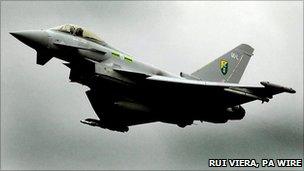Defence shake-up aims to cut waste in procurement
- Published

The National Audit office says the RAF's Typhoon fighter jets have each cost 75% more than predicted
The Ministry of Defence is considering hiring hundreds of experts from the private sector to help cut waste in defence procurement.
Chief of Defence Materiel Bernard Gray says private sector skills could lead to a "cultural and managerial shift".
Last year the MoD's top 15 projects came in £6bn over budget.
The department has been criticised by the National Audit Office and the Public Accounts Committee for its poor performance in procurement.
In the new year, Mr Gray will submit three options to reform the MoD's procurement organisation, which is responsible for sourcing equipment, supplies and services for the armed forces.
All three options involve hiring outside contractors.
"I'm looking at how do I get a significant skills injection from the outside, because it's difficult to solve this problem one person at a time," Mr Gray said.
"Organisations are very conservative, steady places to work where cultural norms persist over long periods of time."
Mr Gray said he was looking at ways of forming partnerships with private sector organisations along the lines used by the Olympic Delivery Authority and the Atomic Weapons Establishment.
"You need enough senior people coming in to be able to move the dial and that may well be hundreds of people.
"Where do you get those kind of people with those different cultural norms? A variety of private sector organisations could provide those skills to us and we need to look at how best to integrate them into our team."
Radical thinking
Defence Procurement Minister Peter Luff said he was waiting for Mr Gray's final report but thought he was "probably right".
"We will be as radical as we need to be to achieve the changes we need to improve the performance of the organisation and I think that will involve a greater involvement with the private sector in some way," he said.
"I'm open-minded on the options. The only thing I'd say is that I think the status quo is unlikely to endure."
Mr Gray was appointed Chief of Defence Materiel by the current government after producing a report for the previous government in which he identified a £36bn black hole in the MoD's budget.
If his ideas are adopted, they would coincide with a downsizing of the MoD's procurement organisation that would see thousands of civil service jobs shed from a current headcount of about 20,000. One source told the BBC the number of civil servants employed in procurement could be halved.
Asymmetric warfare
Defence industry leaders have said the MoD's procurement unit lacks the skills it needs to deal effectively with defence companies.
Robin Southwell, chief operating officer of the aerospace and defence company, EADS, said: "When one is sitting having those negotiations with the MoD, sometimes you feel you're in a process of asymmetric warfare.
"From industry you have professional contract negotiators whose job is to extract the best deal on the best day. From the MoD side, generally you don't have professional procurement executives.
"You do have a situation where on one side you have accountability, deliverability, decision-taking and on the other a less so process."
Ian Godden, who is chairman of ADS, which represents the UK's aerospace industries, said the MoD's procurement unit was "underskilled but overmanned".
"I don't think they've been paying enough to get the best," he added. "We need a major rise in the skill and the pay and a slimming of those procurement people for the 200 significant projects that are on the go at any one time."
Buying Defence will be on BBC Radio 4 at 20:00 GMT on Tuesday, 27 December 2011 and available to listen afterwards online.
- Published16 December 2010
- Published27 January 2011
- Published2 March 2011